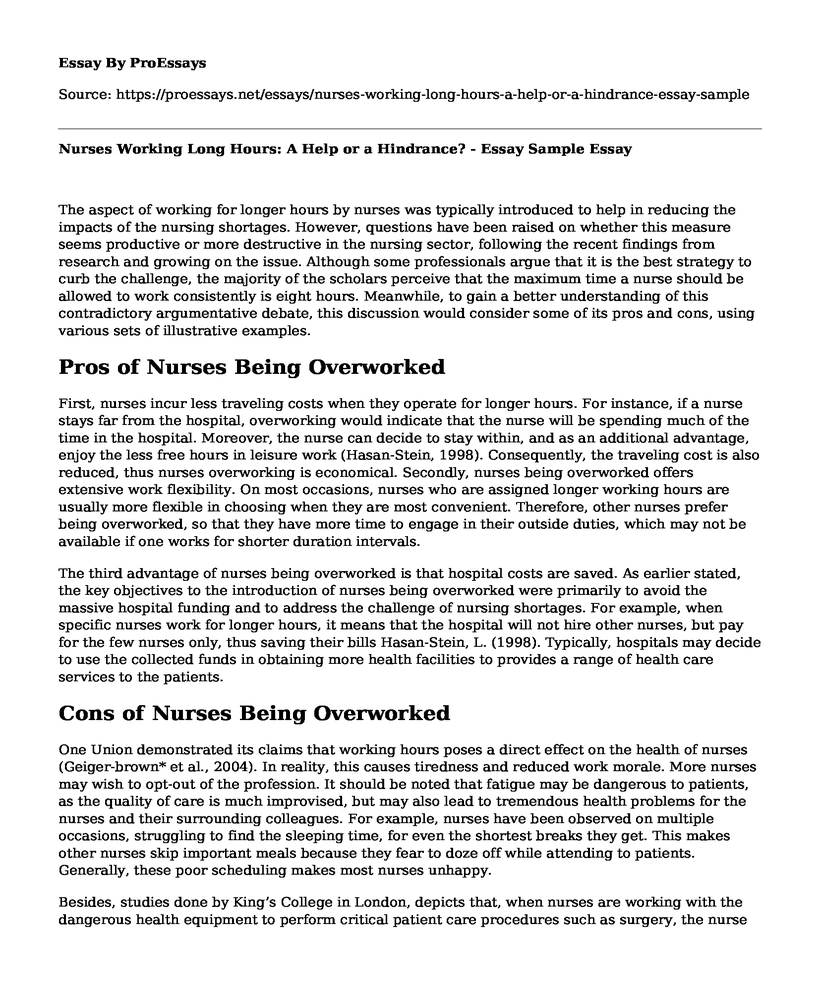The aspect of working for longer hours by nurses was typically introduced to help in reducing the impacts of the nursing shortages. However, questions have been raised on whether this measure seems productive or more destructive in the nursing sector, following the recent findings from research and growing on the issue. Although some professionals argue that it is the best strategy to curb the challenge, the majority of the scholars perceive that the maximum time a nurse should be allowed to work consistently is eight hours. Meanwhile, to gain a better understanding of this contradictory argumentative debate, this discussion would consider some of its pros and cons, using various sets of illustrative examples.
Pros of Nurses Being Overworked
First, nurses incur less traveling costs when they operate for longer hours. For instance, if a nurse stays far from the hospital, overworking would indicate that the nurse will be spending much of the time in the hospital. Moreover, the nurse can decide to stay within, and as an additional advantage, enjoy the less free hours in leisure work (Hasan-Stein, 1998). Consequently, the traveling cost is also reduced, thus nurses overworking is economical. Secondly, nurses being overworked offers extensive work flexibility. On most occasions, nurses who are assigned longer working hours are usually more flexible in choosing when they are most convenient. Therefore, other nurses prefer being overworked, so that they have more time to engage in their outside duties, which may not be available if one works for shorter duration intervals.
The third advantage of nurses being overworked is that hospital costs are saved. As earlier stated, the key objectives to the introduction of nurses being overworked were primarily to avoid the massive hospital funding and to address the challenge of nursing shortages. For example, when specific nurses work for longer hours, it means that the hospital will not hire other nurses, but pay for the few nurses only, thus saving their bills Hasan-Stein, L. (1998). Typically, hospitals may decide to use the collected funds in obtaining more health facilities to provides a range of health care services to the patients.
Cons of Nurses Being Overworked
One Union demonstrated its claims that working hours poses a direct effect on the health of nurses (Geiger-brown* et al., 2004). In reality, this causes tiredness and reduced work morale. More nurses may wish to opt-out of the profession. It should be noted that fatigue may be dangerous to patients, as the quality of care is much improvised, but may also lead to tremendous health problems for the nurses and their surrounding colleagues. For example, nurses have been observed on multiple occasions, struggling to find the sleeping time, for even the shortest breaks they get. This makes other nurses skip important meals because they fear to doze off while attending to patients. Generally, these poor scheduling makes most nurses unhappy.
Besides, studies done by King’s College in London, depicts that, when nurses are working with the dangerous health equipment to perform critical patient care procedures such as surgery, the nurse is required to be fully awake, active and attentive to the maximum recommendable level (Redfern et al., 2002). However, nurses who are being overworked may struggle to adhere to these policies because hunger and sleeping are natural biological processes that cannot easily get controlled. Lastly, nurses being overworked may lead to negative impacts that are preventable such as temporary memory loss. When such effects occur during the treatment or care process, more risks can be sustained. The risks may be subject to their safety, patients within the healthcare center, and work colleagues.
Conclusion
In summary, it is visible from the discussion that almost all of the pros that are related to this act are benefits to the organization itself and some few for the nurses. However, it should be understood that patient safety and quality patient outcome are some of the most significant pillars and determinants of competent healthcare. Therefore, since the cons subject severe problems such as reduced patient safety and quality of patient outcome, it should indisputably be granted more considerations and concerns. Consequently, it can be concluded that nurses are actually overworked, and the cons far much supersede its pros.
References
Geiger-brown*, J., Muntaner, C., Lipscomb, J., & Trinkoff, A. (2004). Demanding work schedules and mental health in nursing assistants working in nursing homes. Work & Stress, 18(4), 292-304.
Hasan-Stein, L. (1998). Two hospitals report: the pros and cons of 12-hour shifts. Nursing New Zealand (Wellington, NZ: 1995), 4(2), 14-15.
Redfern, S., Hannan, S., Norman, I., & Martin, F. (2002). Work satisfaction, stress, quality of care, and morale of older people in a nursing home. Health & social responsibility in the community, 10(6), 512-517.
Cite this page
Nurses Working Long Hours: A Help or a Hindrance? - Essay Sample. (2023, Aug 09). Retrieved from https://proessays.net/essays/nurses-working-long-hours-a-help-or-a-hindrance-essay-sample
If you are the original author of this essay and no longer wish to have it published on the ProEssays website, please click below to request its removal:
- Application Letter for Graduate Program
- Paper Example on Handling Antibiotic Resistance
- Should All Children Be Vaccinated?
- Paper Example on Living with Diabetes Type 1: How to Manage & Live Healthily
- Essay Sample on Assessing Patient Health: Diagnosis, History, & More
- Conflict Management in Nursing: Strategies for Leaders - Essay Sample
- COVID-19: Impact Beyond Biology - A Global Crisis - Essay Sample







